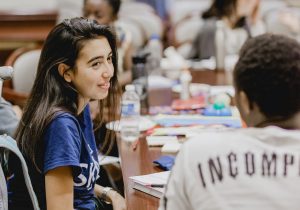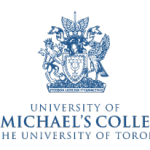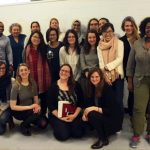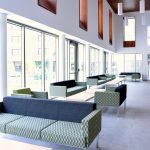 In 2016, the Innovation Hub launched out of a desire to explore two questions: Who are our students? and How is the world changing for them? We wondered how the answers to these questions might shape the ways in which we design programs, services, and resources to support students throughout their time at UofT, from start to finish. We created teams around each domain that were co-led by student and staff leaders who generated insights into students’ experiences and conducted need finding sessions. Based on this information, we came up with five “Big Ideas” to address a few key areas of the student life experience.
In 2016, the Innovation Hub launched out of a desire to explore two questions: Who are our students? and How is the world changing for them? We wondered how the answers to these questions might shape the ways in which we design programs, services, and resources to support students throughout their time at UofT, from start to finish. We created teams around each domain that were co-led by student and staff leaders who generated insights into students’ experiences and conducted need finding sessions. Based on this information, we came up with five “Big Ideas” to address a few key areas of the student life experience.
What we learned from the insights and ideas generated in the first year of the Innovation Hub is that it’s not just the idea that matters, but the way of working. In other words, the process is just as important as the outcome. As the Innovation Hub findings were presented in various forums across the University of Toronto, staff and faculty from many areas were inspired at how the stories of students presented through storytelling and personas provided a new depth of insight into the student experience that can achieve something that can’t be achieved in a traditional focus group, advisory board setting or from survey data. Members of the UofT community reached out to the Innovation Hub for assistance in exploring a particular question or challenge.
Design Research
In partnership with other campus organizations and institutions, from St. Michael’s College to Students for Barrier Free Access, the Innovation Hub is employing its ethnographic approach to answer questions about these student experiences, and to use student-articulated needs to design better campus services. Below are the projects the Innovation Hub is currently collaborating with its partners on.
Integration Experiences for International Students — in partnership with St. Michael’s College
 In September 2017, international students constituted a quarter of the incoming class at St. Michael’s College. How can St. Michael’s best accommodate these students, support their transition to a Canadian university, and help them feel at home at UofT? We interviewed students to find out, and help us design solutions that St. Michael’s can implement to welcome its international students.
In September 2017, international students constituted a quarter of the incoming class at St. Michael’s College. How can St. Michael’s best accommodate these students, support their transition to a Canadian university, and help them feel at home at UofT? We interviewed students to find out, and help us design solutions that St. Michael’s can implement to welcome its international students.
Transforming the Instructional Landscape – in partnership with Academic and Campus Events
 How can we redesign learning spaces to better serve a wide range of students? How does the physical instructional landscape enhance or detract from student learning? We explore these questions and suggest design improvements by engaging with students through a variety of media, including student-guided tours of learning spaces, interviews, post-it note sessions, social media surveys, and direct observation of how students and instructors use learning spaces.
How can we redesign learning spaces to better serve a wide range of students? How does the physical instructional landscape enhance or detract from student learning? We explore these questions and suggest design improvements by engaging with students through a variety of media, including student-guided tours of learning spaces, interviews, post-it note sessions, social media surveys, and direct observation of how students and instructors use learning spaces.
ReDesign SLP – in partnership with Student Life Professionals
Stu dent Life Professionals (SLP) shape and enhance the student experience. How can we best support SLP so they can support students? The Innovation Hub is working with SLP to re-design the community of practice to better support the needs of its members.
dent Life Professionals (SLP) shape and enhance the student experience. How can we best support SLP so they can support students? The Innovation Hub is working with SLP to re-design the community of practice to better support the needs of its members.
Big Ideas
The students have spoken. Based on previous interviews and workshops, the Innovation Hub has identified five ideas that could enhance student experiences at U of T. Will these ideas pan out in a viability assay and move towards an eventual roll-out? This year, we find out. The Big Ideas are:
Chill Spots
 Students need a space to feel at home on campus. Chill Spots could create both a space to relax and a sense of social community. The physical infrastructure—couches, microwaves, charging stations—would provide a small home away from home, and the community animators could help to create a sense of community within the much larger university.
Students need a space to feel at home on campus. Chill Spots could create both a space to relax and a sense of social community. The physical infrastructure—couches, microwaves, charging stations—would provide a small home away from home, and the community animators could help to create a sense of community within the much larger university.
UofT Concierge
 The University of Toronto sprawls across dozens of groups, offices, colleges, and departments. For a student with questions, it can be difficult even to know where to ask. U of T Concierge could provide a one-stop, 24-hour, on-line and in-person port-of-first-call for student questions. It would aim to connect students to the right groups and services for their needs such that every student leaves with a sense of the right next step.
The University of Toronto sprawls across dozens of groups, offices, colleges, and departments. For a student with questions, it can be difficult even to know where to ask. U of T Concierge could provide a one-stop, 24-hour, on-line and in-person port-of-first-call for student questions. It would aim to connect students to the right groups and services for their needs such that every student leaves with a sense of the right next step.
Neighbourhood Communities
 U of T students come to school from all over the GTA, and perhaps even farther away. While diversity is an asset, it can be useful to know students from one’s own geographical area—for one thing, it makes the logistics of ride-sharing and social events more practical. Neighbourhood Communities could connect students with those who live close to them, facilitating student self-organization and building of local support groups.
U of T students come to school from all over the GTA, and perhaps even farther away. While diversity is an asset, it can be useful to know students from one’s own geographical area—for one thing, it makes the logistics of ride-sharing and social events more practical. Neighbourhood Communities could connect students with those who live close to them, facilitating student self-organization and building of local support groups.
Future Readiness Course
 Students want U of T to be a place not only of learning, but of preparation for the world and careers that lie beyond. In addition to the formal courses and programs of majors, minors, and specialists, a Future Readiness Course could allow students to customize their own career-preparation experience, choosing from a menu of career and skill development workshops, industry placements, alumni mentorships, and more.
Students want U of T to be a place not only of learning, but of preparation for the world and careers that lie beyond. In addition to the formal courses and programs of majors, minors, and specialists, a Future Readiness Course could allow students to customize their own career-preparation experience, choosing from a menu of career and skill development workshops, industry placements, alumni mentorships, and more.
Student-Faculty Exploration Café
 U of T boasts of internationally-renowned faculty and strong graduate and research programs. Yet in a university where first-year undergraduate classes number to the hundreds of students, students struggle to engage with faculty and teaching assistants. A Student-Faculty Exploration Café could provide a more informal space for students to interact with their professors and TAs, bridging the gap between those standing at the front of the lecture hall and those in the audience.
U of T boasts of internationally-renowned faculty and strong graduate and research programs. Yet in a university where first-year undergraduate classes number to the hundreds of students, students struggle to engage with faculty and teaching assistants. A Student-Faculty Exploration Café could provide a more informal space for students to interact with their professors and TAs, bridging the gap between those standing at the front of the lecture hall and those in the audience.
→ Our Work